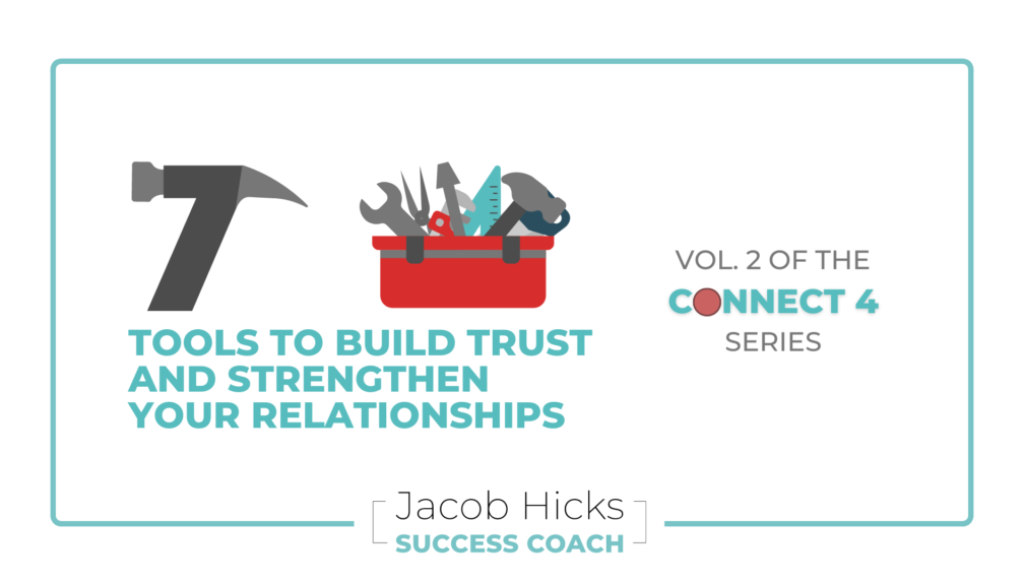7 TOOLS TO BUILD TRUST AND STRENGTHEN YOUR RELATIONSHIPS
Let’s be real—trust is the glue that holds us together. Whether the relationship is romantic, friendly, professional, or anything in between, we need trust. But here’s the thing: building trust doesn’t happen overnight. It takes time. Today, I am going to walk you through 7 tools that’ll help you build trust and strengthen your relationships.
1. BE CONSISTENT – SHOW YOU’RE RELIABLE
This isn’t the same consistency as in my Habits post. This consistency is about showing up the way you said you would. When you’re consistent, people know they can rely on you for the small things and the big things. This is the first step in building trust.
Strategy: Start small—set a reminder or use your calendar to help track your commitments to others. Show up on time when you say you will, and get back to people in a timely manner.
Quick thought: If something comes up that keeps you from following through on what you said you’d do, communicate that as early as possible. As long as this is more of an exception than a rule, people are more likely to be understanding.
2. COMMUNICATE OPENLY – KEEP IT REAL
Honesty is the best policy, right? But this isn’t just about telling the truth; it’s about being open and transparent, even when it’s tough. Say what you mean and mean what you say.
Strategy: Practice active listening (check this out for more on active listening). Tune in to what the other person is saying—no distractions (like phones). Don’t try to plan your response until they finish. Reflect on what they said for deeper clarity.
Quick thought: When you need to discuss something difficult or uncomfortable, use “I” statements to express how you feel without blaming. For example, “I feel concerned when…” instead of “You always…”. This keeps things constructive.
3. SHOW EMPATHY – MAKE THE EMOTIONAL CONNECTION
Trust isn’t just built on logic; it’s also about emotional connection. When you show empathy, you’re telling the other person, “I get you, and I’m here for you. We’re in this together.”
Strategy: When someone shares their feelings, relate by sharing a similar experience, but keep the focus on them. Say something like, “I’ve felt that way too, and it really helped me when…” This shows you understand.
Quick thought: Sometimes, empathy is just about being there. You don’t always have to solve the problem—sometimes, listening and acknowledging their feelings is enough. It can help to ask at the beginning of the conversation if they just need an ear or if they need advice.
4. OWN YOUR MISTAKES – BUILD TRUST THROUGH HONESTY
Let’s face it—nobody’s perfect. No, not even me, which I’m sure comes as a huuuuuge surprise, lol. We’re all a little messy, and that’s okay. What’s important is how you handle those mistakes. Owning up to them, apologizing sincerely, and making things right shows integrity.
Strategy: When you make a mistake, address it head-on. Apologize, explain what went wrong (without making excuses), and outline how you’ll avoid the mistake in the future. For example, “I’m sorry I missed our meeting. I’ll make sure to set a reminder next time.”
Quick thought: Don’t wait for the other person to bring up your mistake. Taking the initiative to apologize first shows maturity and respect. This can often ease hurt better than if they have to bring it up.
5. RESPECT BOUNDARIES – PROVE YOU CARE
Boundaries are there for a reason, and respecting them is crucial for building trust. Whether it’s giving someone space, honoring their time, or understanding their limits, boundaries matter.
Strategy: Ask about (this one can be easy to miss) and respect the other person’s boundaries. Whether it’s how often they like to communicate, their personal space, or their time, make sure you’re in tune with what they need.
Quick thought: Regularly check in with people about their boundaries, especially in evolving relationships. It’s better to ask than to assume.
6. KEEP IT CONFIDENTIAL – PROVE YOU’RE WORTHY OF TRUST
When someone shares something personal or private, keep it to yourself. I know I don’t need to tell you this, but it bears repeating. Keep confidences confidential—simple as that.
Strategy: When someone confides in you, it’s okay to confirm with them that it’s private.
Quick thought: Don’t even hint at private info in conversations with others. Even vague comments can break trust.
7. BE SUPPORTIVE – STRENGTHEN YOUR CONNECTION
Being supportive isn’t just about showing up in the good times—it’s about being there in the mud when things get tough. Whether it’s lending an ear, offering a shoulder to lean on, or just being present, your support matters.
Strategy: Be proactive—don’t wait until someone asks to be supportive. Send a quick text when someone crosses your mind, help with a task, or just listen. Small gestures go a long way.
Quick thought: Tailor your support to each person’s needs. Ask how you can support them instead of assuming what they need.
____________________________________________________________________
Remember that trust is built over time through consistent effort and genuine care. Start practicing these steps today, using the strategies I’ve shared, and watch how your relationships grow stronger.
And hey, if you found this helpful, don’t keep it to yourself!
Share this with someone who could use a little trust-building in their life.
